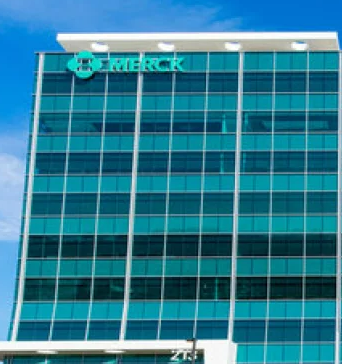Merck is paying $700 million upfront to buy Curon Biopharmaceutical’s bispecific antibody which depletes B cells and is being investigated for non-Hodgkin’s lymphoma and B cell acute lymphocytic leukemia.
Merck on Friday announced an agreement with Shanghai-based Curon Biopharmaceutical, paying $700 million upfront to buy CN201, an investigational bispecific antibody for B cell-associated diseases.
Under the terms of the agreement, Curon is also eligible to receive up to $600 million in potential developmental and regulatory milestones. The deal, which has a maximum value of $1.3 billion if CN201 hits all its targets, is expected to close in the third quarter of 2024 pending customary regulatory and anti-trust clearances as well as other closing conditions.
“Early clinical data have provided robust evidence for the potential of CN201 to target and deplete circulating and tissue B cells with the potential to treat a range of malignant and autoimmune diseases,” Dean Li, president of Merck Research Laboratories, said in a statement. The pharma will reflect charges associated with the transaction in the quarter that the deal closes.
CN201 is an investigational bispecific T cell engager that targets both the CD3 and CD19 proteins. Through this mechanism, CN201 tags B cells for elimination by T cells, giving it therapeutic potential for various B cell-mediated conditions.
The bispecific antibody is currently in a Phase I study for relapsed or refractory non-Hodgkin’s lymphoma and a Phase Ib/II trial for relapsed or refractory B-cell acute lymphocytic leukemia. Early data from these studies point to the potential of CN201 to “induce significant and sustained reductions in B-cell populations,” while being well-tolerated overall, according to Merck.
The pharma plans to continue advancing CN201 in B cell malignancies while also assessing its potential in treating autoimmune disorders.
Friday’s agreement adds to the growing list of deals that Merck has inked in recent months. In May 2024, the pharma announced its $3 billion return to the ophthalmology market with the acquisition of EyeBio and its pipeline of eye therapies, anchored by the first-in-class trispecific antibody Restoret for diabetic macular edema and neovascular age-related macular degeneration.
Merck previously turned its back on eye medicine in 2014 after selling off its ophthalmology assets to Akorn and Santen.
In April 2024, Merck also put forward $208 million to buy University at Buffalo spinoff Abceutics in an effort to improve the safety of antibody-drug conjugates (ADCs). Abceutics’ payload-binding selectivity enhancer technology works by seeking stray payload molecules from ADCs and neutralizing them, reducing off-target effects.
In January 2024, Merck announced the $680 million acquisition of Harpoon Therapeutics, boosting the pharma’s immunotherapy and oncology businesses with the biotech’s investigational T cell engagers.
